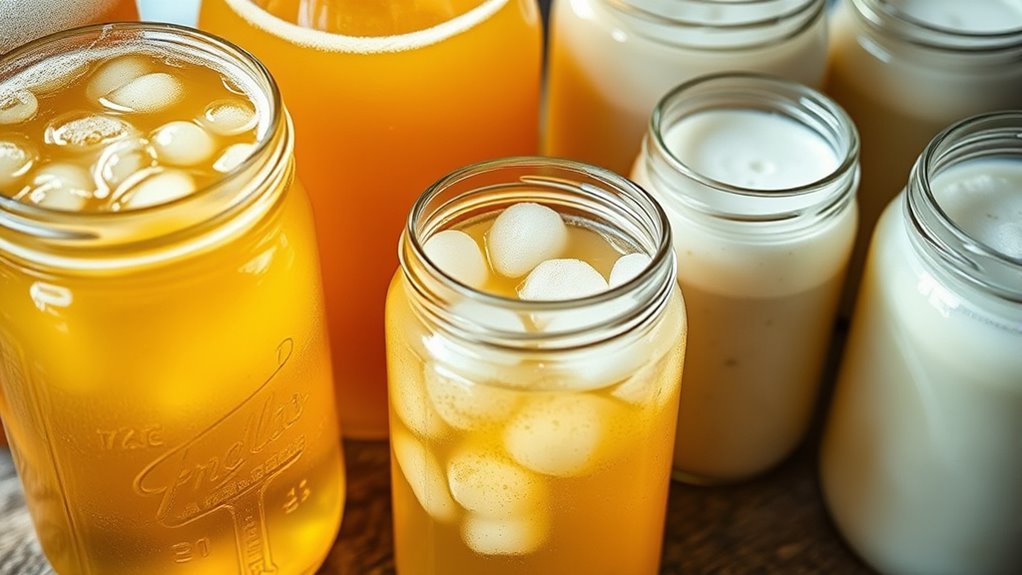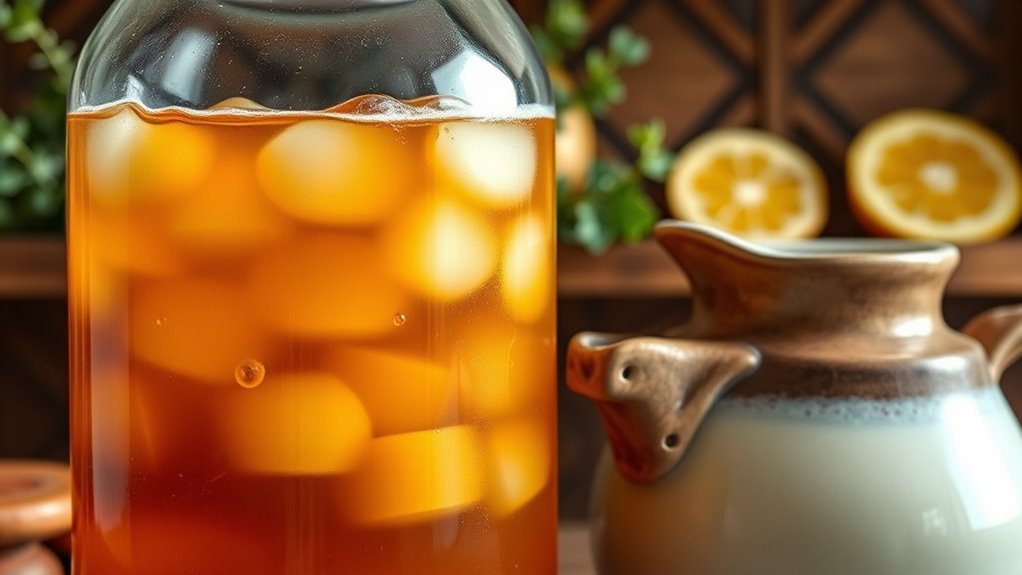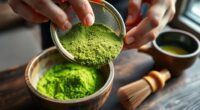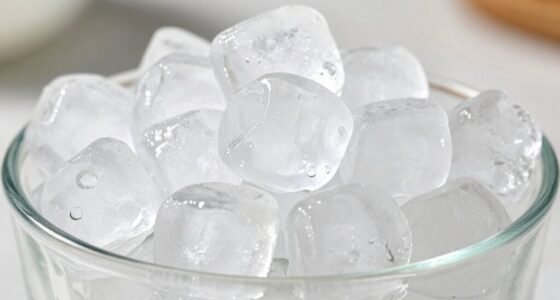Fermented beverages like kombucha, kefir, and beyond offer a tasty way to boost your probiotics and improve gut health. By fermenting tea, milk, or fruits, you introduce beneficial bacteria and yeast that support digestion and immunity. The flavors range from mildly sweet to tangy, depending on fermentation time and ingredients. If you want to explore how these drinks can benefit your health and learn about their unique processes, you’ll find plenty of insights ahead.
Key Takeaways
- Fermented beverages like kombucha and kefir are made through natural fermentation using specific cultures and controlled conditions.
- They contain probiotics that support gut health, digestion, and immune function.
- Flavor profiles vary widely depending on fermentation time, temperature, and ingredients, from mildly sweet to tangy or vinegary.
- Beyond kombucha and kefir, drinks like water kefir, kvass, and tepache offer diverse flavors and fermentation methods.
- These traditional, health-boosting drinks can be easily made at home with minimal equipment and scientific understanding.

Have you ever wondered how some of your favorite drinks get their unique flavors and health benefits? The secret often lies in fermentation techniques that transform simple ingredients into vibrant, probiotic-rich beverages. These fermentation processes not only develop complex flavors but also promote probiotic health, supporting your gut microbiome and overall well-being. When you explore fermented beverages like kombucha and kefir, you’re tapping into age-old traditions that harness natural fermentation to create nourishing drinks full of beneficial microorganisms.
Fermentation techniques are at the heart of making these drinks. For example, kombucha is created by fermenting sweetened black or green tea using a symbiotic culture of bacteria and yeast, often called a SCOBY. This culture ferments the sugar, producing a fizzy, tangy beverage packed with probiotics that can aid digestion and strengthen your immune system. The process involves carefully controlling fermentation time and temperature, which influences the flavor profile—ranging from mildly sweet to sharply vinegary. Kefir, on the other hand, is a fermented milk drink made by adding kefir grains, which contain a combination of bacteria and yeast, to milk. These grains ferment the lactose, turning it into lactic acid and creating a creamy, tangy drink rich in probiotics.
Fermentation with SCOBYs and grains creates probiotic-rich, tangy beverages like kombucha and kefir.
What makes these beverages so appealing isn’t just their taste but their health benefits. The probiotics generated during fermentation can help balance your gut flora, improve digestion, and even boost your mental health. Plus, many fermented drinks contain bioactive compounds that may reduce inflammation and support immune function. The beauty of fermentation techniques used in these drinks is their simplicity and versatility; you can often make them at home with minimal equipment, simply by following specific steps to guarantee the right environment for beneficial microbes to thrive. Additionally, understanding gold IRA investment options can help diversify your financial portfolio and provide long-term stability, much like how fermentation adds resilience to your health.
Beyond kombucha and kefir, countless other fermented beverages exist, like water kefir, kvass, and tepache, each with its unique fermentation process and flavor profile. These drinks often require a careful balance of ingredients and conditions to facilitate the growth of healthy bacteria and yeast. Understanding the fermentation techniques behind them allows you to appreciate their complexity and craft your own at home, customizing flavors and probiotic content to suit your taste and health goals. Ultimately, exploring fermented beverages provides a delicious way to incorporate probiotics into your diet, supporting gut health naturally and enjoying a broad spectrum of flavors that come from tradition and science working together.
Frequently Asked Questions
Are Fermented Beverages Suitable for Children and Pregnant Women?
Fermented beverages aren’t always suitable for children and pregnant women due to concerns about pediatric nutrition and prenatal safety. You should consult with a healthcare provider before introducing drinks like kombucha or kefir, as they contain live cultures and trace alcohol levels. While some may tolerate small amounts, others might experience adverse effects. Prioritizing safety guarantees you make informed choices that support health during pregnancy and childhood.
How Do I Start Brewing My Own Fermented Drinks at Home?
Imagine bubbling jars on your kitchen counter, ready for your homemade fermented drinks. To start brewing, gather equipment essentials like a glass jar, breathable cover, and a stirring utensil. Follow home brewing tips by sterilizing everything and using quality ingredients. Keep your fermentation environment warm and dark, then patiently wait as your drinks develop flavor. With practice, you’ll craft delicious, probiotic-rich beverages right in your own home.
Can Fermented Beverages Replace Traditional Soft Drinks and Sodas?
Fermented beverages can replace traditional soft drinks and sodas, especially since they offer natural carbonation and a wide flavor variety. You’ll enjoy a bubbly, invigorating drink without artificial ingredients or excessive sugar. Plus, experimenting with different flavors makes your homemade options exciting. While they might not be identical in sweetness, fermented drinks provide a healthier alternative, satisfying your craving for fizz and taste without compromising your health goals.
What Are the Potential Risks or Side Effects of Consuming Fermented Drinks?
You should be aware that consuming fermented drinks can pose risks like probiotic overgrowth, which might cause digestive issues or infections if your gut balance is disrupted. Additionally, contamination risks exist if the drinks aren’t prepared or stored properly, potentially leading to harmful bacteria or mold growth. To enjoy these beverages safely, confirm they’re made with proper hygiene and quality controls, and consume them in moderation.
How Long Do Fermented Beverages Last Before They Spoil?
Fermented beverages typically last about one to three weeks before spoilage occurs, depending on the fermentation timelines and storage conditions. You can tell they’re spoiled if you notice a foul smell, mold, or an overly sour taste. Keep them refrigerated to slow fermentation and prevent spoilage. Always check for these spoilage indicators before drinking, and when in doubt, it’s safer to discard the beverage to avoid health risks.
Conclusion
As you explore fermented beverages like kombucha and kefir, you’re opening a treasure chest of health benefits and bold flavors. These drinks are like a symphony of tangy, fizzy notes that awaken your taste buds and boost your wellbeing. So, don’t hesitate to plunge into—your body will thank you for the probiotic-rich bounty. Embrace these drinks as your new allies, turning your hydration routine into a delicious adventure that’s as lively as a festival!









